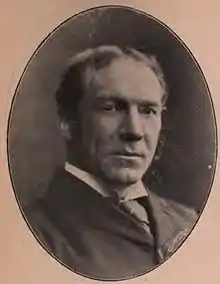Alexander Ure, 1st Baron Strathclyde
Alexander Ure, 1st Baron Strathclyde, GBE, PC, QC (22 February 1853 – 2 October 1928) was a Scottish politician, judge, and georgist land value tax activist.[1]
The Lord Strathclyde | |
|---|---|
 Alexander Ure c.1895 | |
| Solicitor General for Scotland | |
| In office 1905–1909 | |
| Monarch | Edward VII |
| Preceded by | James Avon Clyde |
| Succeeded by | Arthur Dewar |
| Personal details | |
| Born | 22 February 1853 |
| Died | 2 October 1928 (aged 75) |
| Political party | Liberal |
| Alma mater | University of Glasgow |
Life
He was the son of John Ure, Lord Provost of Glasgow and his wife Isabella.[2]
He studied Law at the University of Glasgow he was admitted to membership of the Faculty of Advocates in 1878.
He was Liberal Member of Parliament for Linlithgowshire from 1895 to 1913. He became a Queen's Counsel in 1897.[3]
He provided as Solicitor General for Scotland from December 1905[4] to 1909, and as Lord Advocate from February 1909[5] to 1913. He was an enthusiastic supporter of Lloyd George's 1909–10 budget. He was sworn of the Privy Council in 1909.[6] In 1909, he conducted the prosecution of Oscar Slater for murder; the conviction was later quashed on appeal.
During his working life he lived at 31 Heriot Row, a large Georgian townhouse, in Edinburgh's Second New Town.[7]
On leaving Parliament he was raised to the bench as Lord Strathclyde and appointed Lord Justice General, a post he held until 1920. He was raised to the Peerage as Baron Strathclyde, of Sandyford in the County of Lanark, in 1914. In 1917, he was appointed to the Order of the British Empire as a Knight Grand Cross.[6] He is said to have been skilled in cross-examination, and was more suited to life as an advocate than as a judge.
He retired to his father's house of Cairndhu in Helensburgh in 1920 and died there in 1928. He is buried in Helensburgh Cemetery.[2]
Famous Trials
Ure famously oversaw the trial of alleged murderer, Oscar Slater, now seen as a serious mis-trial. Although Ure sentenced him to death in 1909 the sentence was commuted to life imprisonment. Following a campaign by Arthur Conan Doyle and others Slater received a pardon but only having served 18 years in Peterhead Prison.[8][9]
Family
In 1879 he married Margaret McDowell Steven. their only child was a daughter, Chruistopbel Helen Ure who died in 1918, before the Baron's death.
The peerage therefore became extinct on his death.
References
- Whitehead, Andrew (1 May 2011). "God Gave the Land to the People: the Liberal 'Land Song'". Retrieved 1 July 2018.
- Fullarton, Donald. "Cairndhu owner became Lord Provost". Helensburgh Heritage. Retrieved 1 July 2018.
- "No. 10915". The Edinburgh Gazette. 3 September 1897. p. 849.
- "No. 11787". The Edinburgh Gazette. 19 December 1905. p. 1313.
- "No. 12118". The Edinburgh Gazette. 19 February 1909. p. 173.
- "Page 47077". The Peerage. Retrieved 1 July 2018.
- Edinburgh and Leith Post Office Directory 1905-6.
- Scotland's Murder Mysteries: 4 April 2018.
- The Trial Of Oscar Slater, Wm Roughhead
External links
- Hansard 1803–2005: contributions in Parliament by Alexander Ure
| Parliament of the United Kingdom | ||
|---|---|---|
| Preceded by Thomas Hope |
Member of Parliament for Linlithgowshire 1895–1913 |
Succeeded by John Pratt |
| Legal offices | ||
| Preceded by James Avon Clyde |
Solicitor General for Scotland 1905–1909 |
Succeeded by Arthur Dewar |
| Preceded by Thomas Shaw |
Lord Advocate 1909–1913 |
Succeeded by Robert Munro |
| Preceded by The Lord Dunedin |
Lord Justice General 1913–1920 |
Succeeded by James Avon Clyde |